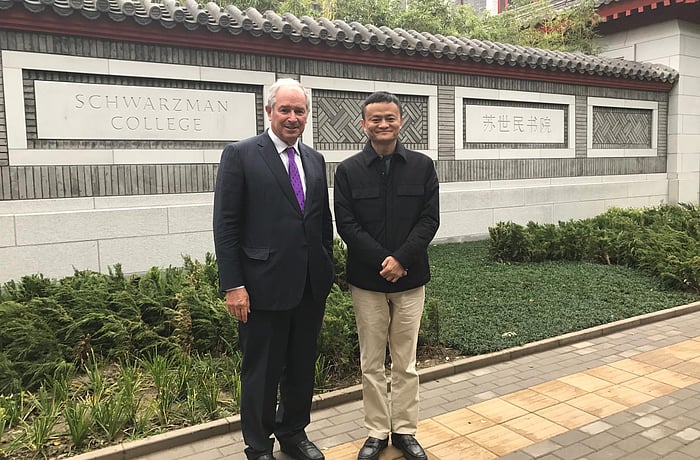“We are no longer a teenager, we just turned 20,” is how Amit Dixit made his opening remarks to the who’s who of India Inc who were in attendance at the Trident to mark the two decades of Blackstone’s presence in the country—a moment to mark the firm’s transformation from an ambitious entrant into one of the most formidable players in the subcontinent’s financial ecosystem.
But as Dixit, Blackstone head of private equity in Asia, went on to say, that the crowd had come to hear the co-founder of the world’s largest alternative asset manager and not him, Stephen (Steve) Schwarzman, the 78-year-old chairman, took centre stage.
The crowd in attendance had heard him speak before—about deals, about resilience, about the art of spotting billion-dollar opportunities. But Friday night, he spoke about something else: a bus ride in Beijing, a conversation with Jack Ma, and a realisation that artificial intelligence (AI) would change the world in ways no one could yet comprehend.
Schwarzman, by his own admission, said, “Like a lot of things in my life, it was an accident [happenstance].”
He was visiting Peking University, China’s answer to Harvard, when Jack Ma—the eccentric, charismatic co-founder of Alibaba—happened to board the same university shuttle. Schwarzman had taken the front-row seat, the one with the most legroom. Jack Ma, shorter than him but equally intent on comfort, took the spot beside him. “Though he’s even shorter than I am, and for some reason, he wanted more legroom!” said Schwarzman.
The ride should have been uneventful—but the rain in Beijing had other plans. As traffic slowed, so did time, and the two men found themselves talking about something Schwarzman had no clue of: the vast, unimaginable potential of AI.
“I said, ‘What’s that? What are you talking about?’” Schwarzman recalled, in his usual self-assured tone.
Jack Ma obliged with a crash course. AI, he said, would be the single most transformative force in the lifetime of humans. It would triple the production of life-saving drugs, make education infinitely more accessible, and redefine economic prosperity in countries like India—where an entire generation could, through nothing more than a smartphone, be lifted into new intellectual and financial frontiers.
When Schwarzman returned to the US, the conversation wouldn’t leave and he rang up Rafael Reif, then-president of MIT, looking for validation. “I just got back from China, and I was talking to Jack Ma about artificial intelligence. Here’s what he said. What do you think?,” he asked Reif.
Reif’s responded, “I think you’re underestimating what’s going to happen.”
In fact, Rief told Schwarzman that the institution was engaged in AI research since 1957.
Schwarzman asked, “So where have you been since 1957?”, to which Reif explained: “Well, we figured it all out, but the problem was that semiconductors weren’t fast enough to process, you know, the information or the data.”
For decades, AI had been an intellectual exercise, a proof of concept trapped in the slow drag of inadequate computing power. But then, in 2012, semiconductors caught up. And once Moore’s Law took hold, the inevitable was set in motion.
Though people relate the advent of artificial intelligence with ChatGPT, which Schwarzman equated it to the intelligence of a really smart human with an IQ of 180 to 200, he went on to boldly state that the world would soon enough be dealing with an AI that fully developed.
“Imagine working with someone at the next desk who has an IQ of 12,000,” Schwarzman words hung in the air as the crowd let out a collective gasp.
Would they be good at their jobs?
Would they anticipate problems before you did?
Would they generate ideas at speeds no human could match?
Schwarzman said that the future isn’t 30 years away and at best, it was 5-10 years from now. “The only thing slowing this down is the ability to build data centres,” Schwarzman noted.
Not surprising that Blackstone, after all, is already investing in the infrastructure that would power AI’s rise, not just across the world but in India as well.
Source:https://www.fortuneindia.com/business-news/jack-mas-ai-prophecy-how-a-bus-ride-in-beijing-turned-blackstones-stephen-schwarzman-into-a-believer/121165

